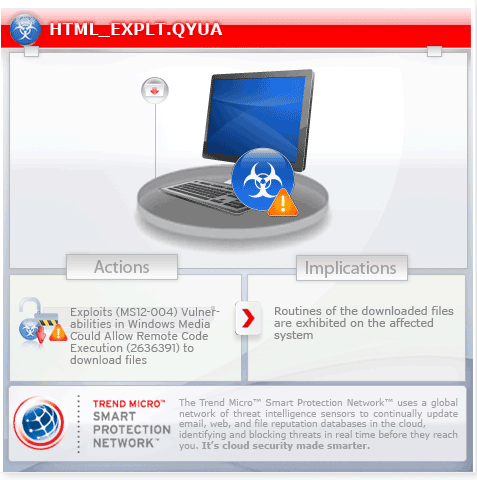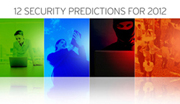HTML_EXPLT.QYUA
Mal/JSShell-B (Sophos)
Windows 2000, Windows XP, Windows Server 2003


Threat Type: Trojan
Destructiveness: No
Encrypted: No
In the wild: Yes
OVERVIEW
This malware is an infection vector related to a vulnerability which is triggered when Windows Multimedia Library in Windows Media Player (WMP) fails to handle a specially crafted MIDI file, consequently allowing remote attackers to execute arbitrary code.
To get a one-glance comprehensive view of the behavior of this Trojan, refer to the Threat Diagram shown below.

This Trojan executes when a user accesses certain websites where it is hosted.
It executes the downloaded files. As a result, malicious routines of the downloaded files are exhibited on the affected system.
TECHNICAL DETAILS
Arrival Details
This Trojan executes when a user accesses certain websites where it is hosted.
It may be downloaded from the following remote sites:
- http://{BLOCKED}s.{BLOCKED}p.com/mp.html
Download Routine
This Trojan takes advantage of the following software vulnerabilities to download possibly malicious files:
After successfully exploiting the said vulnerability, this malware connects to the following URLs to possibly download other malicious files:
- http://{BLOCKED}s.{BLOCKED}p.com/tdc.exe - detected as TROJ_DLOAD.QYUA
It then executes the downloaded files. As a result, malicious routines of the downloaded files are exhibited on the affected system.
Other Details
This Trojan requires the following additional components to properly run:
- http://{BLOCKED}s.{BLOCKED}p.com/is.js - detected as JS_EXPLT.QYUA
- http://{BLOCKED}s.{BLOCKED}p.com/baby.nid - detected as TROJ_MDIEXP.QYUA
SOLUTION
Step 1
For Windows XP and Windows Server 2003 users, before doing any scans, please make sure you disable System Restore to allow full scanning of your computer.
Step 2
Remove malware files dropped/downloaded by HTML_EXPLT.QYUA
Step 3
Close all opened browser windows
Step 4
Scan your computer with your Trend Micro product to delete files detected as HTML_EXPLT.QYUA. If the detected files have already been cleaned, deleted, or quarantined by your Trend Micro product, no further step is required. You may opt to simply delete the quarantined files. Please check this Knowledge Base page for more information.
Step 5
Download and apply this security patch Refrain from using these products until the appropriate patches have been installed. Trend Micro advises users to download critical patches upon release by vendors.
Did this description help? Tell us how we did.



